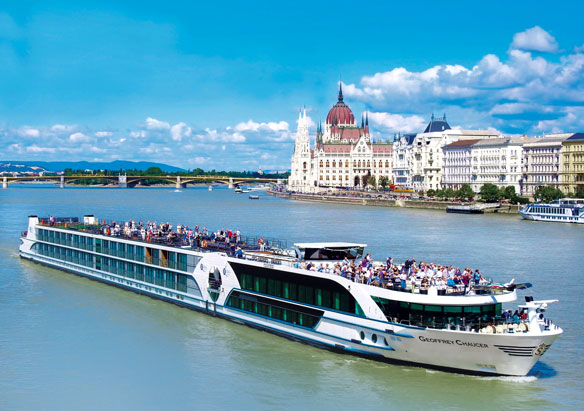
Familiarity breeds success
Riviera River Cruises finding its support of agents paying off

BOB MOWAT
It’s not like Riviera River Cruises simply appeared out of nowhere. The cruise company has been sailing for close to 40 years in the U.K., but it’s only been in the last 3 years that it has begun to chart a course in the North American market. While COVID-19 has hit hard, the cruise company’s executive vice-president, sales & marketing North America, Marilyn Conroy is hopeful that it will begin sailing again in late August, early September. Here’s what Conroy had to tell CTP in a recent Q&A …

Conroy
Riviera River Cruises’ parent company has been in business in the United Kingdom for 36 years. About 14 years ago, they launched river cruises in the U.K. and they’re now the largest provider in that marketplace. Three years ago, they entered the North American marketplace and they’ve already received three very prestigious awards, two from Travel Weekly and one from Solo Traveler. We’re at the top of the premium category for river cruises, but offer prices that are below premium. We boast the youngest fleet on European waterways with no ship older than six years and most within three years. We have a total of 13 ships covering 20 itineraries on 10 rivers.
COVID-19 has hit the cruise industry hard. Can you talk a little bit about that and how you see things playing out for the cruise industry; and how Riviera River Cruises has been impacted by the pandemic and how it is planning to move forwarding
Like everyone, we’ve been hard hit having to lay up our ships since March. We’re encouraged that we should be able to start sailing again at the end August or in early September. But this has had an impact on our company, forcing reorganization so that when we’re able to sail again we’ll be stronger than before. Fortunately, Riviera’s owners have deep pockets and the company is structured to ensure we’ll be in this business for the long haul.
What do you see as the role of travel agents? Where do they fit in Riviera River Cruises ‘recovery’ plans? And how have you or are you working with them?
Riviera prides itself on being the only cruise line that is 100% supportive of our travel agency partners. We don’t accept bookings directly from consumers. When we receive a consumer booking inquiry, we turn that business over to a travel advisor with whom we’re working proactively in the area where that person is located. And we turn that business over to the advisor at full commission. No other river company can say that – we’re hoping advisors will support us as we so openly support them. We’re also creating more programs that will appeal to consumers, offering savings like our “summer sail” of up to $2,000 off per cabin on our longer cruises, for example. Offers like these give Riviera an outstanding price/value proposition. With our ships’ spacious cabins and suites, and luxurious accommodations and amenities, we offer a superior product to guests. And we’ve seen a 97% guest satisfaction level, so advisors should feel comfortable knowing their clients will return happy and we won’t try to sell to them directly. The only consumer marketing we do is in tandem with advisors on a cooperative basis.
Now I understand that the company’s bookings are up significantly – 300% – for 2021 over 2020. What’s the reason (or reasons) for that jump? Is this new business? Or is this future travel credit business?
All of the above. We obviously had many of our canceled 2020 guests move to 2021, but those who hadn’t finalized their booking for 2020 yet just moved to 2021, therefore, like a lot of companies, we’re combining nearly two years of bookings into one. I also believe that since we’ve been in business in North America for three years now, advisors’ clients are returning happy and spreading the good word about Riviera, and that is helping our sales overall.
River cruising – at least until the pandemic – has been growing in popularity at head-spinning rates. Do you see this continuing once people become comfortable travelling again? And if you do, how long do you think that’s going to take for consumers to reach that comfort level?
Yes, for the past few years river cruising has been the fastest growing segment of the travel industry, with no sign of slowing until now. Consumers want to travel, and I believe river cruising will be one segment of travel that will resume quickly. The ships are smaller, which makes them easier to keep clean and to implement a higher level of social distancing – the same will apply for smaller ocean cruise ships as well. One of the biggest deterrents to travel for now isn’t just “health and safety,” but the fear of being quarantined. Until we have accurate tests and a vaccine, we won’t be back to our original projected numbers.
Are there things that the cruise industry can do or that Riviera River Cruising is doing to help travellers become comfortable with travelling and with cruising again?
Mainly, stressing enhanced onboard health and safety standards – hand sanitizer dispensers everywhere, cleaning public surfaces frequently, no self-serve or open buffets, and regular testing of crew. That combined with accurate tests and a vaccine.
I also wanted to ask you whether COVID-19 had a greater impact on the ocean cruising market, than on the river cruising market. And if you think it did, why was that impact greater?
Yes, I believe the larger ocean liners did suffer more than river cruise companies or smaller ocean ships. Ships are required to report any health issues they have on board, unlike hotels, and the media love to dramatize negative things. Unfortunately, outbreaks on large ocean liners were prominently publicized early on and therefore the press continued to focus on the large lines. It’s true that larger ships are more difficult to keep clean, but ships are overall the cleanest place to be. They are governed by the USPH and their kitchens are likely to be cleaner than the kitchen in any home or upscale restaurant. Studies have shown that fewer people died of the virus after being on board a ship than on an airplane, in a hotel or enjoying public activities in general. The impact was also larger because ocean liners are more expensive to lay up, while river cruise ships can be laid up relatively easily.
Last question. Are you optimistic or pessimistic about the future of travel? Why?
I am optimistic because I truly believe the public sees travel as a right, not just a privilege. Initially, I think travel closer to home will see the first uptick, but the lure of Europe and exotic places will always be there. The forward booking pattern demonstrates that people want to continue to explore new places. Look at the growth in the expedition market – that’s not slowing down. Yes, we will return in short order, just as soon as we get a vaccine.
